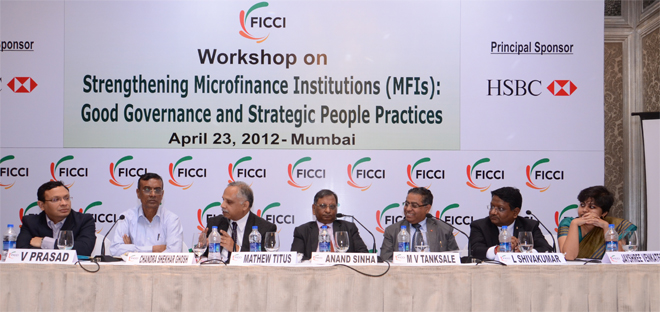FICCI had organised a panel discussion followed by a workshop on “Strengthening Microfinance Institutions (MFIs): Good governance and Strategic People Practices” on April 23, 2012 in Mumbai. The objective of the workshop was to examine contemporary debates in governance, with a specific focus on the unique context of Microfinance Institutions. The day-long event began with a key note address by Mr. Anand Sinha, Deputy Governor, Reserve Bank of India, who spoke about the need for microfinance institutions to focus on ways in which they could handle their concentration risk, reduce operational costs and manage corporate governance.

At the panel discussion, from left: Vishwanath Prasad (Director, Caspian Advisors), C.S. Ghosh (CEO and Founder, Bandhan Financial Services Pvt. Ltd.), Mathew Titus (Executive, Director, Sa-Dhan), Anand Sinha (Deputy Governor, Reserve Bank of India), M.V. Tanksale (Chairman and Managing Director, Central Bank of India), Shivakumar (Senior Group Vice President, ICRA Ltd), and Jayshree Venkatesan (CEO, IFMR Mezzanine Finance Private Limited).
The key discussions centred on the unique context of the microfinance sector, the resultant need for governance and what governance means in this context. The key points were as follows:
1) Customer protection: Given that the beneficiary of a microfinance institution’s services is a client belonging to a low income household, customer protection can be manifested through:
a. Greater transparency: Disclosure of effective interest rates to the customer
b. Recovery practices: Ensuring recovery practices and delinquency management practices are clearly defined
c. Good control mechanisms: Internal audit systems with regular contact points with randomly selected customers; establishing a feedback loop to strengthen processes. It is important to make sure that a senior person within the organisation is responsible for ensuring client protection is maintained
2) Evolving the overall strategy:
a. Short term vs. long term: Ensure that the board represents all the stakeholders’ interests and that short term decisions are not taken, which may be sub-optimal in the long run
b. Ensure an organisational culture to ensure that long term performance is incentivised
c. Business plan: Revisit the business plan in the current context of changing regulation to make sure that adequate diversification is factored in
3) Board composition and role of the board:
a. Striking a balance between investor directors and independent directors
b. Importance of having an independent director and the role of an independent director: how does one overcome the current shortage of independent directors in the sector
c. Board connect: Ensure that the board of directors visits various field centres at least once a quarter
To sum up, what governance does is to determine what is measured and how it is rewarded, which has an overall impact on the strategy followed by the organisation as it grows. Incorrect measurement can result in decisions that are sub-optimal in the long run, making it necessary to have board members who can balance the short and long term.


